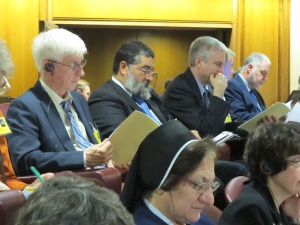Synod catch-up: the Uruguayan bishops and excommunication
A few weeks ago, while I was at the Synod of Bishops, it was widely reported that the bishops of Uruguay had announced the excommunication of all legislators who voted to legalize abortion in that nation.
I knew that couldn’t be right.
Either (A) the press had mistranslated and/or mischaracterized what the bishops actually said (which happens often) or (B) the bishops were mistaken in their canonical assessment of the situation (which happens sometimes), but either way, I knew—and say this, I suggest, in common with virtually very canonist who has considered this issue—that legislators cannot, under the 1983 Code as it reads now, be excommunicated for voting to legalize abortion.
Turns out to have been Option A—the Uruguayan bishops had not said “excommunicated”, they had said something more like “not in communion” to describe the state of legislators who commit the grave evil of exempting preborn babies from the protection of civil laws against murder. Mind, “not in communion” is a very serious situation (see, e.g., Canon 209 and Lumen gentium 14), but “not in communion” is not “excommunicated”.
Wish I could have saved folks the confusion this story generated for a time but, being in Rome and otherwise occupied, I just couldn’t get to it then. Anyway, we’re clear on things now and can get back to the task of educating civil legislators about their civil responsibilities to the defenseless and to the correct administration of ecclesiastical discipline.




Comments are closed.